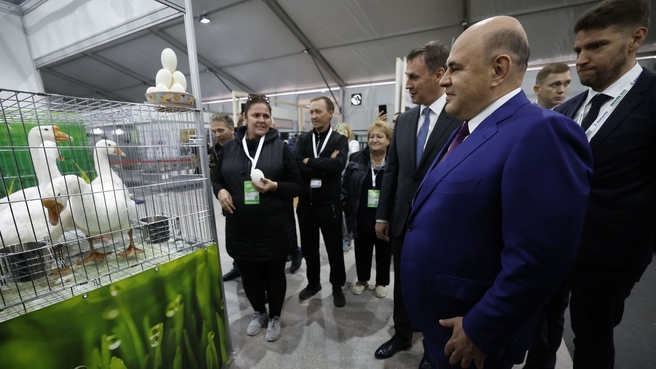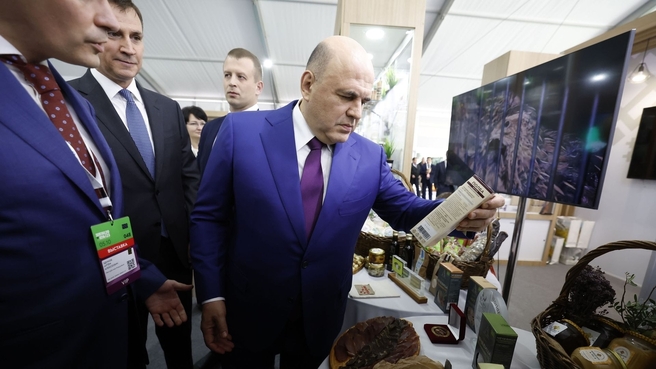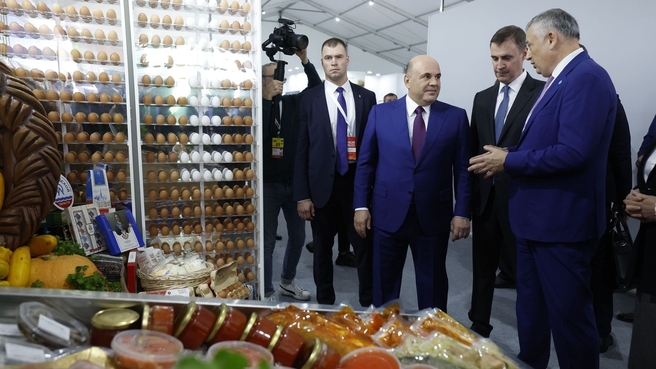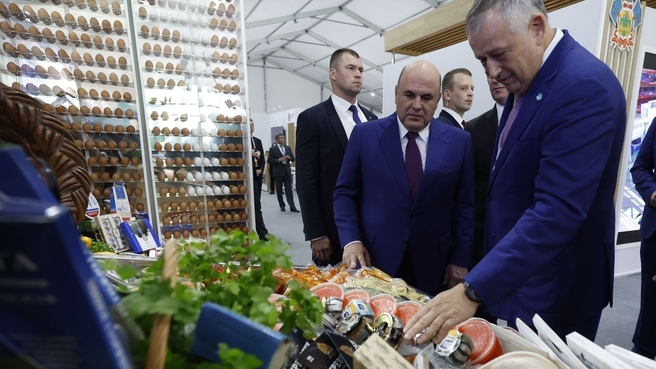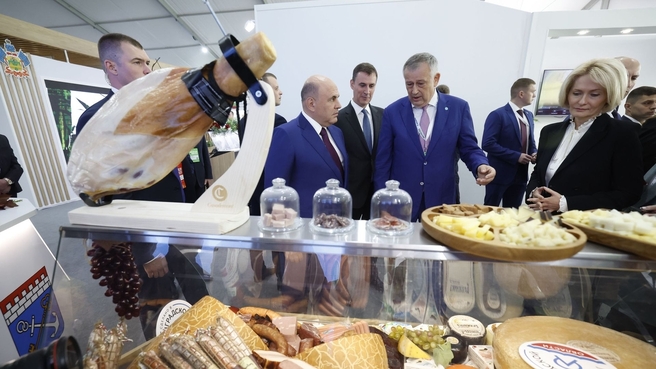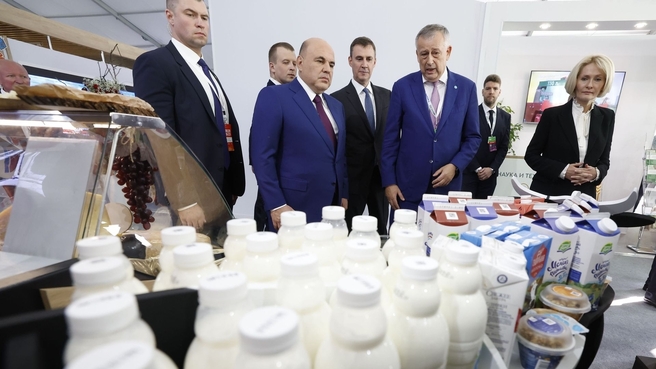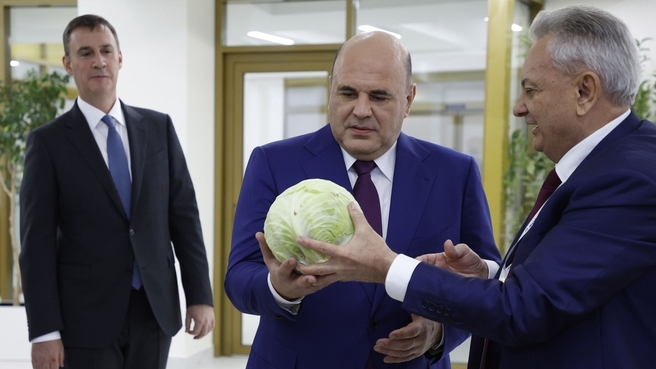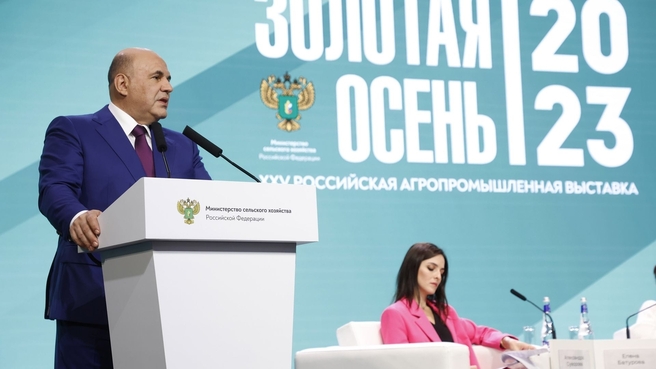The Prime Minister spoke at the plenary session “Investing in the future: a modern look at agrarian education,” and presented state awards for great contributions to the development of agriculture to workers of the agro-industrial sector.
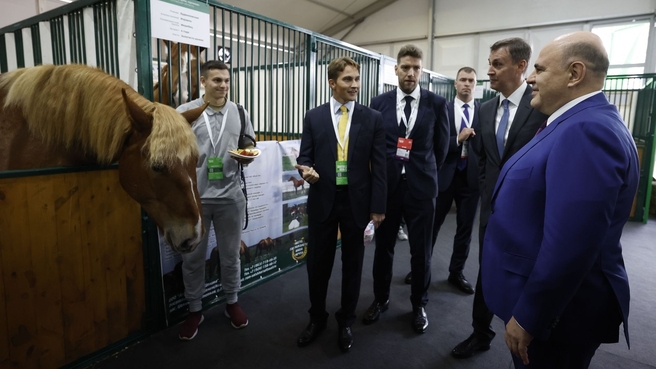
Mikhail Mishustin at the Horse Breeding arena at the 25th Russian agro-industrial exhibition Golden Autumn. With Minister of Agriculture Dmitry Patrushev
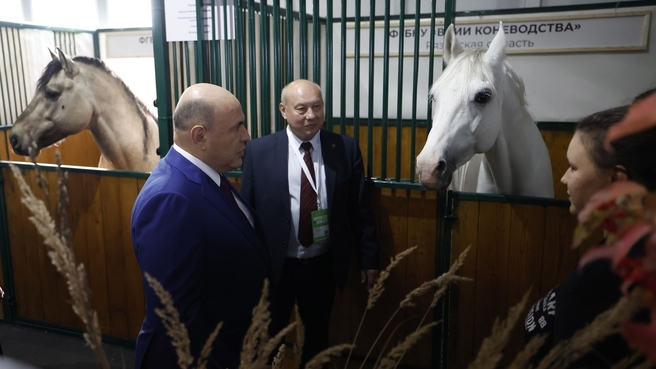
Mikhail Mishustin at the Horse Breeding arena at the 25th Russian agro-industrial exhibition Golden Autumn
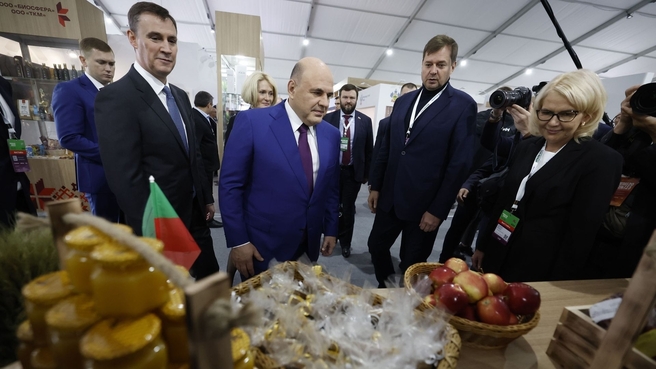
Mikhail Mishustin at the 25th Russian agro-industrial exhibition Golden Autumn. With Viktoria Abramchenko and Minister of Agriculture Dmitry Patrushev
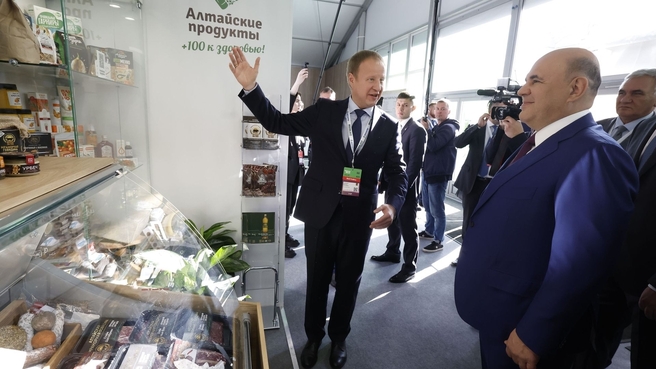
Mikhail Mishustin at the 25th Russian agro-industrial exhibition Golden Autumn. Stand of the Altai Territory. Governor of Altai Territory Viktor Tomenko gives an explanation
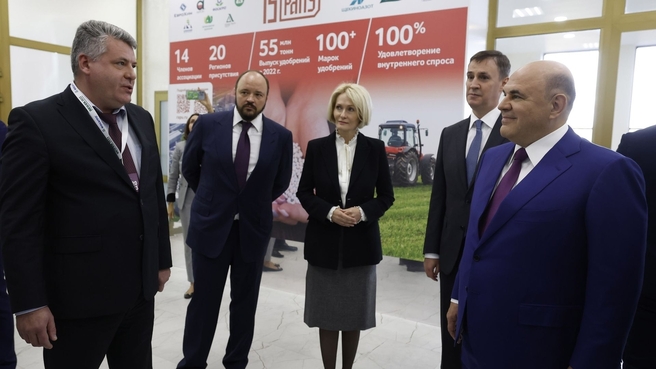
Mikhail Mishustin at the 25th Russian agro-industrial exhibition Golden Autumn. With Viktoria Abramchenko and Minister of Agriculture Dmitry Patrushev
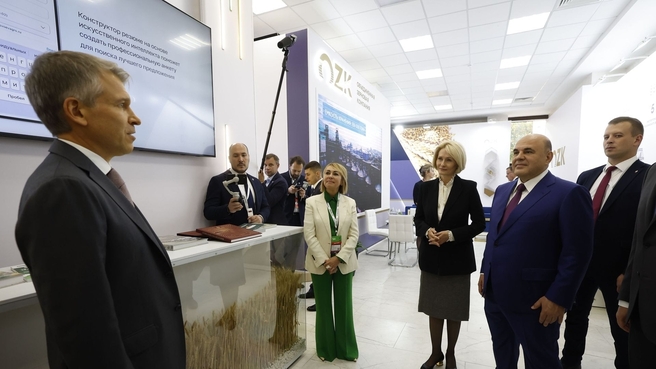
Mikhail Mishustin at the 25th Russian agro-industrial exhibition Golden Autumn. With Viktoria Abramchenko and Minister of Agriculture Dmitry Patrushev
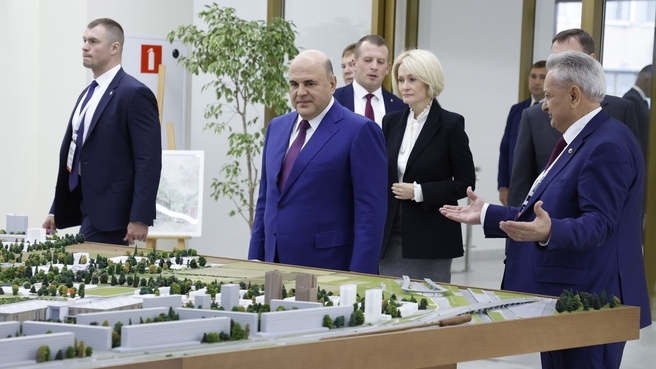
Mikhail Mishustin at a presentation of the activities and development of the Russian State Agrarian University – Moscow Timiryazev Agricultural Academy
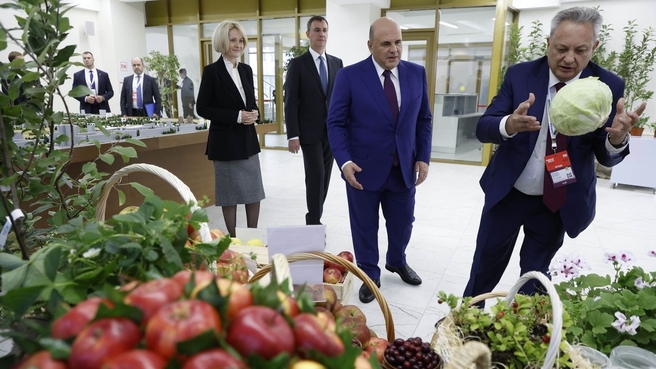
Mikhail Mishustin at a presentation of the activities and development of the Russian State Agrarian University – Moscow Timiryazev Agricultural Academy. With university rector Vladimir Trukhachyov
Mikhail Mishustin at the Horse Breeding arena at the 25th Russian agro-industrial exhibition Golden Autumn. With Minister of Agriculture Dmitry Patrushev
The Russian agro-industrial exhibition Golden Autumn is the main business event in Russia’s agro-industrial sector. This agrarian forum, the largest in Russia, has been organised by the Russian Ministry of Agriculture annually since 1999. The exhibition is timed to coincide with the Day of the Worker of Agriculture and Processing Industry, which is celebrated annually on the second Sunday of October.
In 2023, the 25th Russian agro-industrial exhibition Golden Autumn will be held on 4 to 7 October. This year for the first time its venue will be the Russian State Agrarian University – Moscow Timiryazev Agricultural Academy, with its main theme being the development of agrarian science and education.
The exhibition will traditionally present achievements of the agro-industrial sector, including in technological and scientific support. The finest breeds of farm animals, the largest investment projects in the regions, developments in improving soil fertility, financial products for agribusiness – all this and much more can be enjoyed in pavilions, at outdoor displays and during presentations by leading companies in the industry.
The event will be attended by companies from different branches of the agro-industrial sector. Constituent entities of the Russian Federation will also present their achievements. The total area of the exhibition is 12,000 square metres.
Mikhail Mishustin’s speech at plenary session:
I saw the introduction video and it seemed to me to be less upbeat than your actual achievements and than everyone present in this room.
I would like to welcome all of you, both participants in the Golden Autumn exhibition and its guests. This is the 25th time that we are holding this event. Each display is convincing evidence of the achievements of domestic agriculture.
President Vladimir Putin emphasised that our country is one of the world’s key suppliers of agricultural products and has earned a reputation as a reliable and stable partner.
We take heartfelt pride in the achievements of the Russian agricultural sector. Credit for these results this goes, primarily, to the people working in this sector.
I want to congratulate you in advance, dear friends, on the Day of the Worker of Agriculture and Processing Industry, which we will mark soon. By celebrating this day, we pay tribute to your demanding work. I want to take this opportunity to thank each of you for everything you are doing for our people, and our big and great country.
The subject of today’s meeting is agricultural education. So, I believe it is important to congratulate all our teachers, including, of course, the hospitable teachers of the Timiryazev Agricultural Academy, and your rector, on Teachers’ Day, which we are marking today.
I believe it bodes well for the forum as it begins with a [professional] holiday and will conclude ahead of another red-letter day.
Each student has had a mentor, or teacher in his or her life who has shown attention and care, guiding him or her toward a future career. Such a person not only offered tips on what books to read, but was also a person from whom a student could seek advice. Of course, I want to extend my most sincere congratulations to all teachers and mentors. Once again, let me wish you a happy holiday!
Colleagues, it is important that the current education system prepare young people for the challenges of tomorrow and produce qualified specialists demanded by the industry. To do this, we need to clearly understand our strengths, and understand which areas need additional support.
Let me briefly address the current situation in agribusiness.
The basic indicators of the Food Security Doctrine have been achieved and some – concerning grain, sugar, vegetable oil, meat, and fish – have even been exceeded.
We probably do not expect a record grain harvest like last year, but the result will still be good. According to preliminary data, as the harvesting campaign has not yet been completed in some regions, we plan to collect about 130 million tonnes. Thus, this will be enough for both the domestic market and for fulfilling our obligations to our partners.
We can also see positive dynamics in the production of potatoes, fruits and vegetables, especially in greenhouses. This means that our people will enjoy a wide range of high-quality Russian food.
The Government continues to closely monitor the situation in agribusiness. And we are ready to respond quickly to the industry’s needs, just as we did when the Bank of Russia changed its interest rate.
The federal budget includes 158 billion roubles for short-term and investment loans at a rate of up to 5% this year. But, naturally, it is now clear that we need more significant measures.
Thanks to the President’s support, in September we allocated additional funds totalling about 55 billion roubles, which will make it possible to fulfil the obligations we have taken upon ourselves and subsidise the upcoming seasonal work in the fields.
And of course, we are assisting small farms, including individual farmers and rural cooperatives. Over 12 billion roubles were allocated this year for these purposes, including the grants Agrostartup and Agroprogress, subsidies to agricultural cooperatives, and the marketing of products from private farms.
There is an upbeat outlook for agricultural tourism. This is the second year that grants have been given to promote it and the [agricultural] sector is taking an increasingly greater interest in this activity. There are over 200 projects in the pipeline.
There are also new projects in other areas, many of which, incidentally, are on display at the Golden Autumn exhibition. Good progress has been made on logistics, processing, seed farming, and selection. Farmers are mostly seeking domestic solutions, which, given current external restrictions, is an important step towards strengthening our country’s technological sovereignty.
Developing rural areas is among our work’s key objectives. We are addressing this issue under the relevant state programme.
In Russia today, approximately 25 percent of the population lives outside of urban agglomerations. We need to improve their living standards. Then qualified specialists will start looking for jobs in rural areas.
Of course, resolving the housing issue is among our priorities. Here we use two tools, which are well known to everyone.
First, people can take out a mortgage at a reduced rate of 3 percent per annum, a measure which was introduced four years ago. It is still available, despite the difficult situation, including with the budget. Over this time some 110,000 families have taken out mortgages.
Another measure is building accommodation to let, which allows employers to attract new personnel. Over 100,000 square metres of housing have already been commissioned and over 54,000 square metres will be built by year end.
We are also investing considerable funds in building modern infrastructure in rural areas. People need schools, child-care centres, hospitals, and ambulance services. Of course, they want to have playgrounds, workout areas for adults, community centres, and libraries. Today we also spoke about access to the internet.
Since early 2023, we have allocated over 26 billion roubles for implementing territorial development projects. We have also set aside over 10 billion for improving rural roads.
In all, we have allocated about 65 billion roubles for implementing the state programme this year. There is also a number of attendant programmes. Of course, we will continue this work.
For example, we are implementing a government initiative to establish a chain of basic communities in the countryside and in small cities. We will establish their social, transport, and communications infrastructure more rapidly than anywhere else. There are about 1,800 such communities nationwide. We discussed a report on this issue today.
We expect this approach to create people-friendly rural agglomerations where incoming residents will be able to study, undergo medical treatment, enjoy leisure time, and engage in sport activities. Of course, young specialists will be able to choose precisely these communities, rather than major cities, after objectively assessing all conditions. I know that these people do not simply emerge on their own, and that there is already quite an impressive amount of them. Today, the esteemed Governor of Novosibirsk reported that they are monitoring the situation, and that people are returning to the countryside.
It appears that the conditions of a problem that we all must solve are easy and understandable. This sector is growing nowadays. Of course, the quality of life in rural territories is changing for the better, albeit gradually. Serious state support is also making this possible. Last year, we allocated over 420 billion roubles for these purposes, and we will preserve approximately the same volumes in 2023. The draft three-year federal budget that has been submitted to the State Duma also stipulates the relevant funding.
It is highly important to decide how many professionals and for what particular sectors of the agro-industrial complex we will have to train.
This industry, as is absolutely clear, requires that we introduce the most innovative solutions. It should be more science-intensive, technological, and innovative in order to remain as effective as it is now, and to develop it further.
For this, we need specialists versed in smart field cultivation, gene engineering, robotics, food waste recycling, and other areas that are no less important. Today we saw two digitalised startups presented by young designers and engineers from two regions, complete with digital transformation. It’s astonishing!
In response to our new mission, we are now redesigning the educational system from the secondary school level up. Today, we have listened to some reports. More than 20,000 pupils across the country attend related agricultural classes where they can become familiarised with the latest in agricultural science.
Beginning this academic year, we have engaged vocational schools to train skilled personnel in these fields under the Professionals programme.
Grants to this effect have been extended to a number of colleges, five of them agricultural, operating under the aegis of ten universities, including in Penza, Omsk, Saratov, the Stavropol Territory, and the Altai Territory. While walking in this exhibition, we came across representatives from these regions who showed us their performance results.
There are more than 3,000 major holding companies that work directly with universities, which number 46, including Timiryazev University.
We support this approach and compensate up to 90 percent of the costs businesspeople incur training their employees and promising students. This year, the federal budget is allocating over 225 million roubles for this purpose, which will enable approximately 4,500 people to complete employer-sponsored education and take on-the-job training.
Another six universities training personnel for the agricultural industry have joined the Priority-2030 state programme. I am referring to Timiryazev University, Stavropol, Kuban, Saratov, and Far Eastern universities, and Buryat Agricultural Academy. They are engaged in serious applied and fundamental research. Voronezh Agrarian University has been made part of the Advanced Engineering Schools federal project and will train specialists for hi-tech industries.
Timiryazev Agrarian University has a special role to play in the academic process as it has scientific schools in all areas of importance for agriculture, including 51 student startups. I just spoke with a few of the students on this subject.
What’s more, the system of personnel training to meet the needs of the agro-industrial complex continues to develop actively. Experimental training programs are being created, such as internships in veterinary medicine, an area that is essential to ensuring biosecurity.
The Government is well aware of the importance of this work and is ready to support solutions facilitating renovation of the agrarian education system.
Colleagues,
Friends,
Over these years, the Golden Autumn exhibition has become a really important venue for dialogue between representatives of most varied communities, such as agricultural producers, industrial plants, experts, Russian regions, and our partners from abroad. All of you have an opportunity to exchange best practices, find new approaches, and master new interesting methods.
I want to cordially wish you productive work, health, and wellbeing, both to you and your loved ones.
Thank you and happy holiday!
